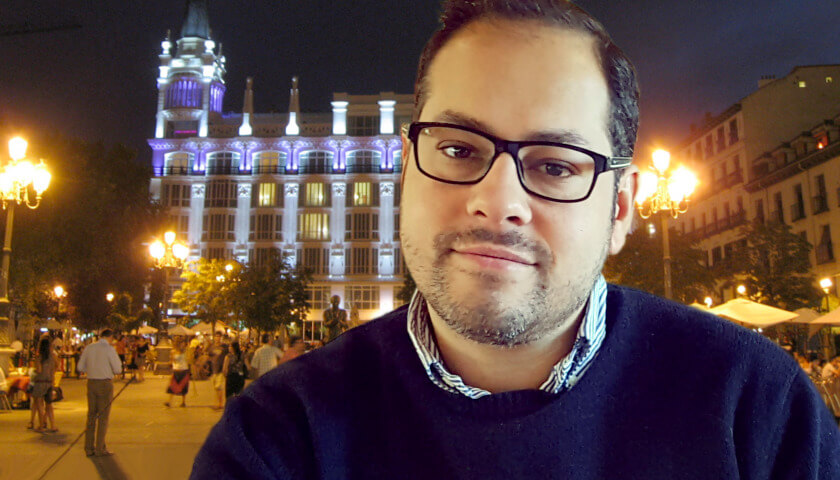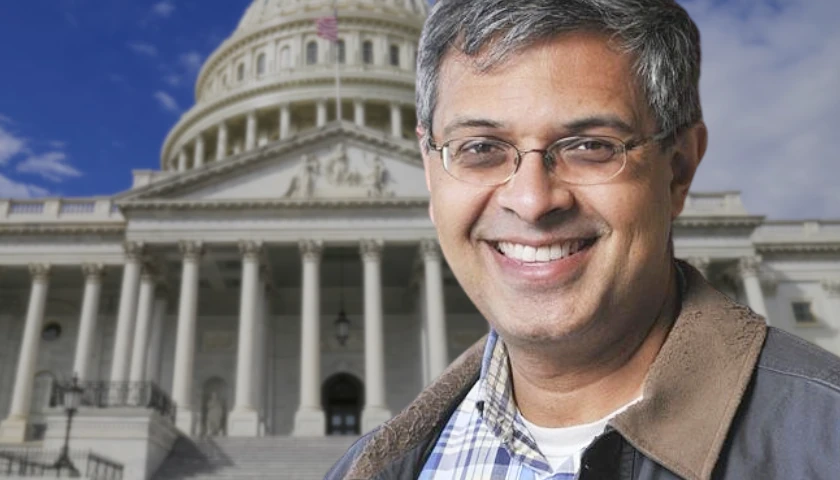by Itxu Díaz
Translated by Joel Dalmau
They say that in Europe our things are tiny and that in America your things are super-sized, and that’s a dangerous statement, prone to error when referring to anything other than the size of our Coca-Colas.
Any further debate could lead to a conflict of unprecedented proportions and distract us from the real issue: Here in Europe we are jealous of a lot of what you have in the United States of America. In particular, three things: God, liberty and civil society. In the social democratic Europe we live in, these three pillars have all but disappeared like the sun setting at the dusk of a civilization. In their stead we are left with secularism, conditional freedom and an all-encompassing state that demands money from us day and night in the form of taxes, while all we can do is shrug our shoulders, pay up and say, as did Bartleby: “I’d prefer no to.”
I write these lines, sit in a German alehouse “Cervecería Alemana” in Plaza Santa Ana in Madrid, an old cafe in which the dazzling Ava Gardner whittled away hours when she was living in Madrid, and in which Hemingway often sought refuge in good beer and beautiful people common to so many other bars in Europe. Midway through the 20th century another celebrated writer would also sit here. The Spaniard, Enrique Jardiel Poncela, was a successful comedian that, just over 30, relocated to the United States to write scripts for Fox studios.
 He had such a penchant for tucking himself away in a bar in Madrid to write, that they had to build his office in Hollywood to resemble one, for him to be inspired. Jardiel hated the Hollywood vibe and on returning to Spain said that Americans were like “big kids,” although I’m not sure that’s actually a criticism. He also wrote that if a European wanted to understand America, he would have to buy, on arrival there, a “Bible, an automobile and a corkscrew.”
He had such a penchant for tucking himself away in a bar in Madrid to write, that they had to build his office in Hollywood to resemble one, for him to be inspired. Jardiel hated the Hollywood vibe and on returning to Spain said that Americans were like “big kids,” although I’m not sure that’s actually a criticism. He also wrote that if a European wanted to understand America, he would have to buy, on arrival there, a “Bible, an automobile and a corkscrew.”
The corkscrew bit troubles me, even though these were the ’30s. By the way, his epitaph read: “If you want everyone to praise you, die.” When he did die, before his corpse had grown cold, everyone did praise him. And immediately afterward, not having ever displayed any political affiliation, everyone forgot about him. If there is anything this brilliant Spanish comedian got right, it was to be free, gaining himself enmity from both left and right. The European press has never been made for freedom, which is nothing other than the ability to say and do whatever you want and the strength to shoulder the consequences.
We envy almost everything about the press in America, from its independence from the government to the bravery shown by many of its greatest journalists, often opting for honor in harakiri — in ink — when the cause is a worthy one; sometimes it’s a sad collective suicide, like when they try to portray Nancy Pelosi as a rising star in the practice of origami. But even a despicable silver-screen
Half the things that opinion-makers in the States would make the secular public in secular Europe shake in their boots and cross themselves, and that’s another thing that you got right: It’s important to call an imbecile an imbecile if you don’t you run the risk of confusing the public. And nothing describes the average European: confused and stunned. We’re not even well-manipulated à la Soviet, because even though the left wing tries whenever it can, the European center-right works ceaselessly toward that postmodern sickness called appeasement.
The outcome is that the right wing receives the brunt of the insults, the left being better liars, and nobody can freely say whatever they want in a newspaper without first reading carefully the European Single Thought Law. There are 70 million Twitter users just waiting to write your column, coming close to choking on their own bile as they spit insults at you, while your own contribution to social unrest is safely censored. If you’re right wing, they’ll come down on you like a ton of bricks.
To disagree, to think freely, to stand out, is to dig your own grave in modern Europe. There is a very European bias toward the bureaucratic structuring of private initiatives that becomes truly exasperating. Even in love.
Maybe because of liberty, the United States helps people become millionaires while Europe hinders them. Sometimes quite embarrassingly so. Just one example. Spain’s new social communist government has threatened to cripple rich people with taxes. As a result, an exodus to Portugal has begun. What does this government do? Rectify? No. They threaten with consequences against those leaving. This is all we could expect from a government whose vice president criticizes and insults the owner of Inditex, my brilliant fellow countryman Amancio Ortega, for having donated expensive, latest generation cancer treatment machines, to Spanish hospitals. According to Spanish Vice President Pablo Iglesias, the Spanish public health service doesn’t need “handouts” from the rich. Maybe he’s right. But the Spanish cancer patients sure do. Some people just keep proving Jardiel Poncelaright again when he said: “Those that don’t dare to be intelligent, become politicians.” There are exceptions, but they’re not in Pedro Sánchez’s government.
As a rule, the States’ civil society is healthier than the European because it’s careful not to devote itself to mass ideological prostitution. I said “mass,” I’m not here to naively canonise the whole country, ignoring that you’ve had presidents whose main virtue was knowing how to dance salsa. But even then it’s different. Your genuinely democratic culture — impossible to export– makes it easy to get rid of cretins that manage to reach office.
In Europe, the more independent civic leaders raise their voices and lead all they can, but only until they’re gobbled up by one party or another. Then they become accommodated and their voices become muddled. That might very well be the problem: this very European obsession with security, be it employment, unemployment, social life, housing or relationships. Everything has to be as secure and predictable as German engineering, which is why there exists a certain disdain for the American dream. If America can be reduced to a hamburger, part of the European elite can be reduced to the unassembled pieces of a wardrobe from Ikea; if they ever manage to get it together, in an armed conflict, you’ll find me on the hamburger’s side.
Somehow mobility and meritocracy muddy the social democrat dream, which as with communism, needs poor and hungry to survive. Sometimes I wonder why modern Europeans are so enthusiastic about living when most of their state tutored, predictable and bureaucratic lives are a bore. Obviously Mediterranean Europe is the exception; boredom is impossible there.
All of this has a tragic consequence. The lack of a sense of humor extends like a plague throughout the continent. Europe has lost its sense of humor and that’s it’s drama. You only need see that safety warnings printed on any appliance produced in the European Union to understand how total safety and security is an illness. You can’t take your job so seriously. If you sell phone batteries, don’t place a warning on them, in 10 different languages, asking the buyer not to nibble on it. Don’t make a fool of yourself in 10 different languages. The legal cobweb covering the Old Continent making you do it is no excuse. Exporting illegal batteries is better than looking like a world-class idiot all over the world.
But Europe takes itself too seriously. Everything is regulated in its pocket-sized nations. Everything is vital. Everything is serious. Everything is exceedingly dull. Americans can joke and laugh about filling some dictator full of holes without tearing their hair out and crying, which is exactly what the French, Belgian or the Danes do. The Dutch aren’t laughing so loud this week because some genius in the government has decided it would be a good idea to legalize an anti-old people pill. Suddenly, Dutch progressive OAPs, that have been smoking spliffs since their teens, feel less enthusiastic about death-dealing because they’ve realized that in this year’s Halloween parties they will be the dead.
Incidentally, proof of Europe’s idiotization is that, given a choice as to what we import from the United States, instead of choosing liberty, wealth or the size of the damn ice in our drinks, we chose Halloween, which we would gladly send back to you in a box with its corresponding bow and a thank-you note “always thinking of you.”
Something else we envy. When a policeman shoots down a dangerous terrorist, you all ask how the policeman is and swell with pride over his heroism. In Europe though, public opinion and the media react differently:
Couldn’t he have spared the man’s life?
Was it proportional?
Did he read him his rights?
He wasn’t gunned down for wearing explosives and six machetes, he was murdered for being an Arab.
The same happens with military ops. If no one botches it, America will still rally behind their military when they are deployed, even if there has been political dissent. These small shows of unison that upstage the differences, around basic issues, are what make a nation great. Small things can be huge.
Maybe because Americans don’t believe that the state will save them, and much less guarantee them everlasting life within the foreseeable future, they still choose to trust in God. And that’s understandable. When one sees Bernie Sanders and thinks, if an electoral catastrophe were to occur, that one’s life would be in his hands, it’s a huge relief to know you always have God to save you.
What’s more, God is present daily in the lives of men that, as with any civilization, want to transcend their own arrogance. Which is why, when a politician finishes speaking with a “God bless America!” no one is surprised or shocked. It even sounds good, magnificent, glorious. On the other hand, in Europe, if one finishes his speech with a “God bless Sweden!” or “God bless Denmark!” it just doesn’t work. It’s almost like saying “God bless the International Monetary Fund!” It doesn’t even sound good. What’s more you’ll instantly see people rise from their seats and call out:
Why do you say “God”? I’m an atheist. It’s offensive.
Why do you say “God” and not Goddess? Chauvinist! It’s offensive.
Why do you say “God” and not Mother Nature? I identify as a rabbit. Ethnocentrist! It’s offensive.
In the end you just give up, leave God out of it, but reference Satan because you want to send the whole world to hell. But then, once more, another uproar, like a cat fight on Twitter:
Christianocentric! Islamophobe. Allah is great. It’s offensive.
That’s when you decide to put an end to the event and hang yourself in a toilet stall. That’s how things are in Europe.
Of course, Europe also has the History, it’s still at the origin of our civilization, illustrious ruins, Spanish literature, British humor, Houllebecq and Swedish women. But it also has its fair share of disappointments. France was supposed to be fun. All of my damned bohemians burned Paris down between opium dens, poetry and whisky. It was all just an illusion. These days their grandchildren don’t go out at night, they only read the state’s Official Bulletin and instead of alcohol, they down copious amounts of ecological tea in vegan tea shops where they extract the tea by caressing the leaves.
What about Spain? My country is another matter. Spaniards are only Europeans during work hours. From six in the afternoon onward — Brussels time — we stop being European and we do whatever we feel like until 8 a.m. the next day. This makes other Europeans feel awkward when they come to do business here. They would much prefer to see a hoard of fools following one another mindlessly through the streets like Lemmings, that strange video game from the ’80s. I mean they would rather be in Berlin than Madrid. We don’t do it because we love partying, but to safeguard the essence of ancient Europe, when Romans would commit the seven deadly sins all together, leave work mid-afternoon for a siesta and always found an excuse for a toast (not the bread one). Our sacred duty as Spaniards is to keep these worthy traditions alive, whatever Brussels says.
It’s not that Europe is a bad idea, just the same as the — oh so different — United States isn’t either. Europe, and I mean the European Union, is a place where we can sit down and talk instead of being gunned down and invaded. It has its benefits, especially in what concerns public spending on weapons. But neither Americans nor Europeans can permit themselves to be complacent. Europe needs to recover its identity or Brexit will be just the beginning, and America needs to keep an eye on what’s happening over here, because no one’s immune to a plague of stupid people corrupting the power. Although I suspect that in the end, whatever happens in the future, here in Europe, we’ll always be jealous of the size of your missiles, Reagan’s politics, Scarlett Johansson’s beauty, George Clooney’s elegance and having a president who tweets all in caps.
– – –
Itxu Díaz is a Spanish journalist, political satirist and author. He has written nine books on topics as diverse as politics, music or smart appliances. He is a contributor to The Daily Beast, National Review, The Federalist and Diario Las Américas in the United States, and columnist several Spanish magazines and newspapers. He was also an advisor to the Ministry for Education, Culture and Sports in Spain. Follow him on Twitter at @itxudiaz or visit his website www.itxudiaz.com.
Photo “Itxu Díaz” by Itxu Díaz.





